Hilton Food Group: Structure, Management, and PESTEL Analysis
VerifiedAdded on 2023/01/05
|13
|3627
|38
Report
AI Summary
This report provides a comprehensive analysis of Hilton Food Group plc, a UK-based food packaging business. It begins with an introduction to the business environment and an overview of Hilton Food Group's founding and operations. The main body of the report is divided into three tasks. Task 1 examines the structure, management, and governance of Hilton Food Group, including its organizational structure, board of directors, and key personnel. Task 2 highlights the importance of PESTEL analysis for business organizations, emphasizing its role in identifying opportunities and threats. Task 3 applies PESTEL analysis to Hilton Food Group, evaluating the political, economic, social, technological, environmental, and legal factors influencing the company's operations. The report concludes with a summary of the key findings and a list of references.
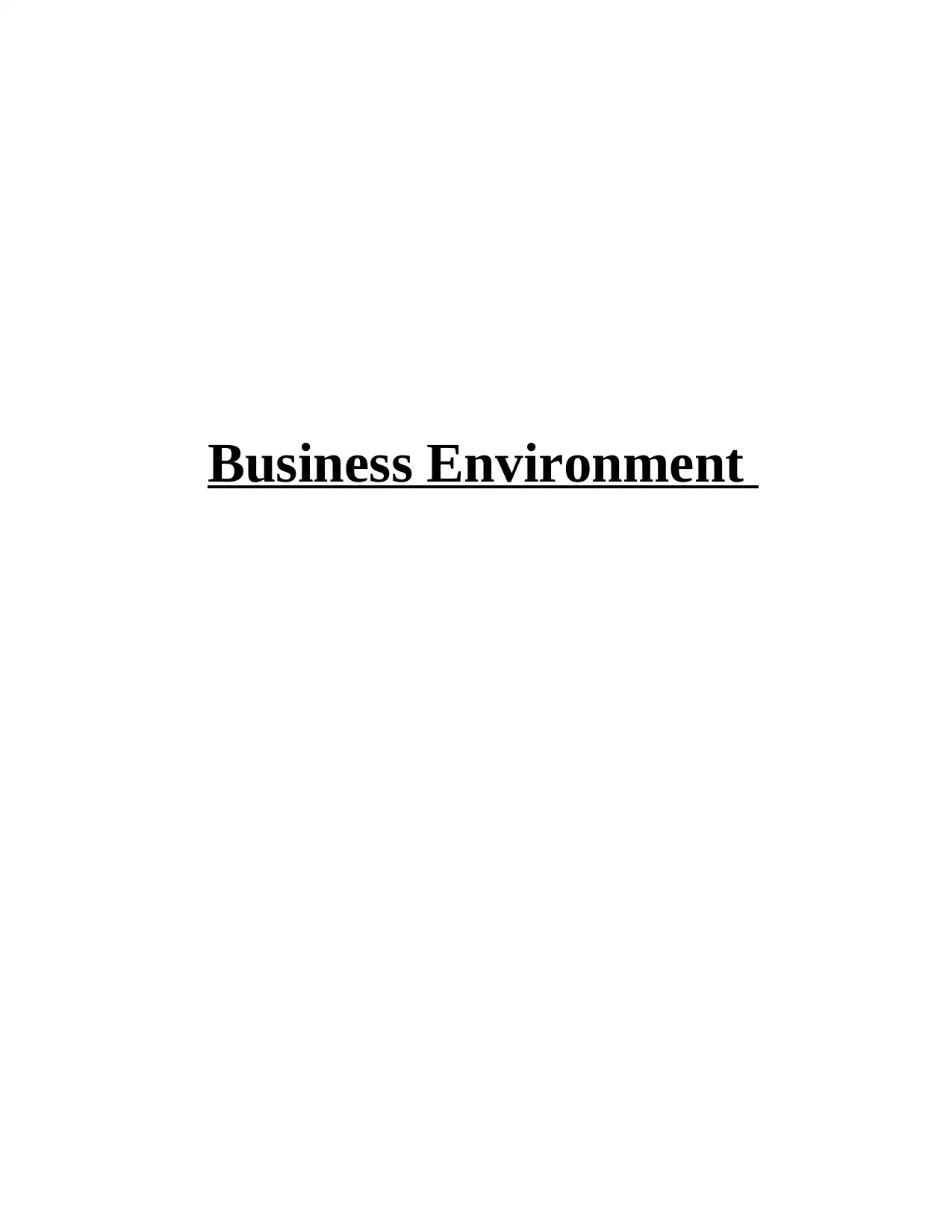
Business Environment
Paraphrase This Document
Need a fresh take? Get an instant paraphrase of this document with our AI Paraphraser
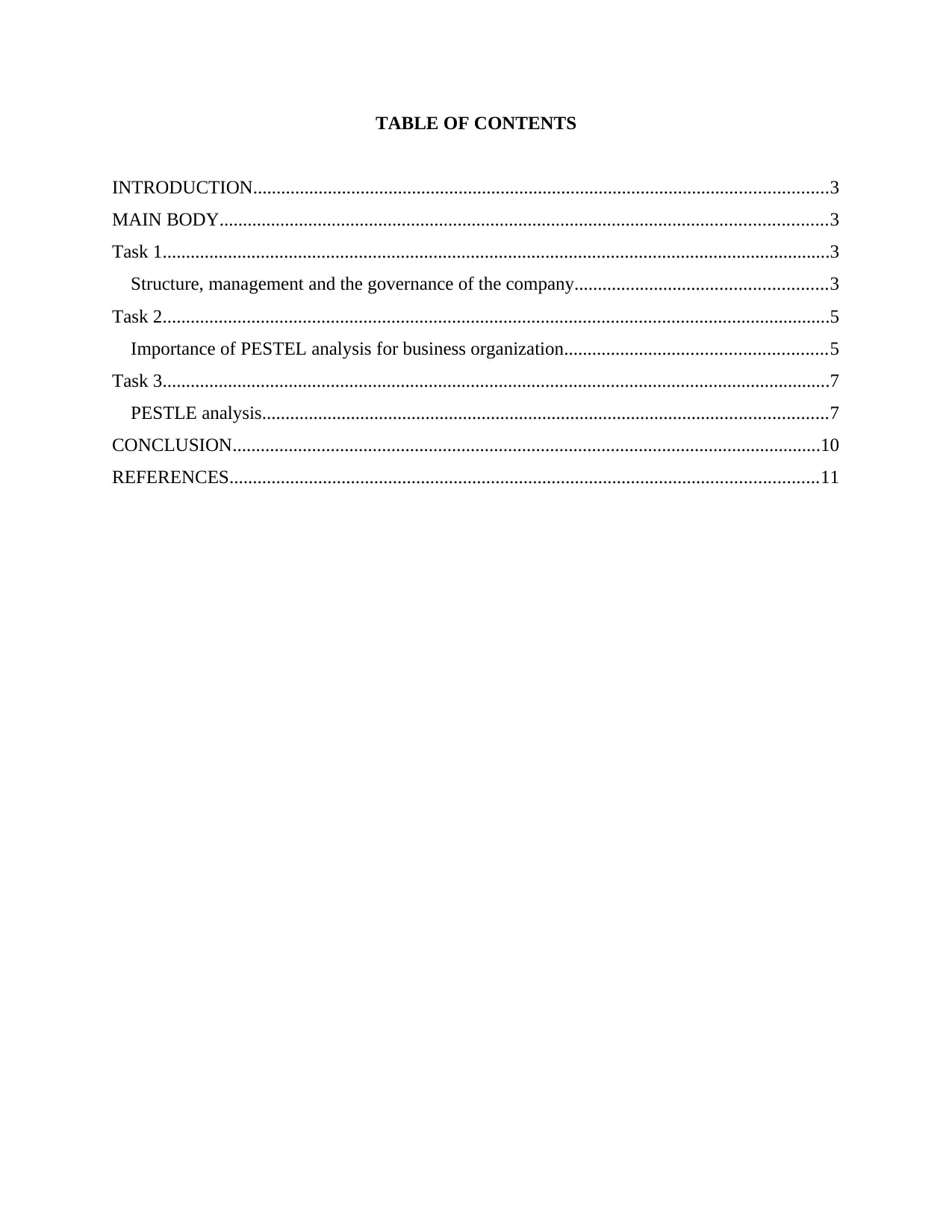
TABLE OF CONTENTS
INTRODUCTION...........................................................................................................................3
MAIN BODY..................................................................................................................................3
Task 1...............................................................................................................................................3
Structure, management and the governance of the company......................................................3
Task 2...............................................................................................................................................5
Importance of PESTEL analysis for business organization........................................................5
Task 3...............................................................................................................................................7
PESTLE analysis.........................................................................................................................7
CONCLUSION..............................................................................................................................10
REFERENCES..............................................................................................................................11
INTRODUCTION...........................................................................................................................3
MAIN BODY..................................................................................................................................3
Task 1...............................................................................................................................................3
Structure, management and the governance of the company......................................................3
Task 2...............................................................................................................................................5
Importance of PESTEL analysis for business organization........................................................5
Task 3...............................................................................................................................................7
PESTLE analysis.........................................................................................................................7
CONCLUSION..............................................................................................................................10
REFERENCES..............................................................................................................................11
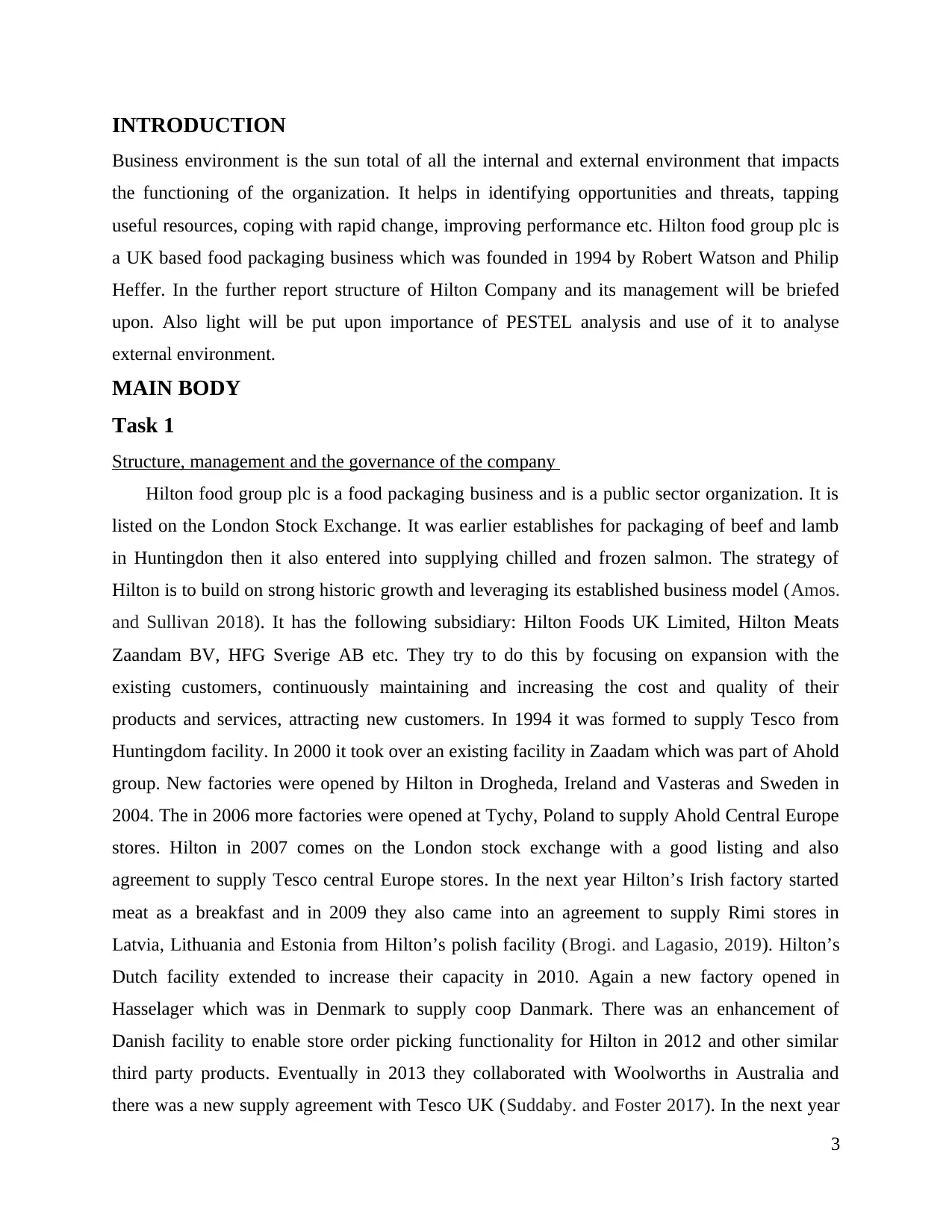
INTRODUCTION
Business environment is the sun total of all the internal and external environment that impacts
the functioning of the organization. It helps in identifying opportunities and threats, tapping
useful resources, coping with rapid change, improving performance etc. Hilton food group plc is
a UK based food packaging business which was founded in 1994 by Robert Watson and Philip
Heffer. In the further report structure of Hilton Company and its management will be briefed
upon. Also light will be put upon importance of PESTEL analysis and use of it to analyse
external environment.
MAIN BODY
Task 1
Structure, management and the governance of the company
Hilton food group plc is a food packaging business and is a public sector organization. It is
listed on the London Stock Exchange. It was earlier establishes for packaging of beef and lamb
in Huntingdon then it also entered into supplying chilled and frozen salmon. The strategy of
Hilton is to build on strong historic growth and leveraging its established business model (Amos.
and Sullivan 2018). It has the following subsidiary: Hilton Foods UK Limited, Hilton Meats
Zaandam BV, HFG Sverige AB etc. They try to do this by focusing on expansion with the
existing customers, continuously maintaining and increasing the cost and quality of their
products and services, attracting new customers. In 1994 it was formed to supply Tesco from
Huntingdom facility. In 2000 it took over an existing facility in Zaadam which was part of Ahold
group. New factories were opened by Hilton in Drogheda, Ireland and Vasteras and Sweden in
2004. The in 2006 more factories were opened at Tychy, Poland to supply Ahold Central Europe
stores. Hilton in 2007 comes on the London stock exchange with a good listing and also
agreement to supply Tesco central Europe stores. In the next year Hilton’s Irish factory started
meat as a breakfast and in 2009 they also came into an agreement to supply Rimi stores in
Latvia, Lithuania and Estonia from Hilton’s polish facility (Brogi. and Lagasio, 2019). Hilton’s
Dutch facility extended to increase their capacity in 2010. Again a new factory opened in
Hasselager which was in Denmark to supply coop Danmark. There was an enhancement of
Danish facility to enable store order picking functionality for Hilton in 2012 and other similar
third party products. Eventually in 2013 they collaborated with Woolworths in Australia and
there was a new supply agreement with Tesco UK (Suddaby. and Foster 2017). In the next year
3
Business environment is the sun total of all the internal and external environment that impacts
the functioning of the organization. It helps in identifying opportunities and threats, tapping
useful resources, coping with rapid change, improving performance etc. Hilton food group plc is
a UK based food packaging business which was founded in 1994 by Robert Watson and Philip
Heffer. In the further report structure of Hilton Company and its management will be briefed
upon. Also light will be put upon importance of PESTEL analysis and use of it to analyse
external environment.
MAIN BODY
Task 1
Structure, management and the governance of the company
Hilton food group plc is a food packaging business and is a public sector organization. It is
listed on the London Stock Exchange. It was earlier establishes for packaging of beef and lamb
in Huntingdon then it also entered into supplying chilled and frozen salmon. The strategy of
Hilton is to build on strong historic growth and leveraging its established business model (Amos.
and Sullivan 2018). It has the following subsidiary: Hilton Foods UK Limited, Hilton Meats
Zaandam BV, HFG Sverige AB etc. They try to do this by focusing on expansion with the
existing customers, continuously maintaining and increasing the cost and quality of their
products and services, attracting new customers. In 1994 it was formed to supply Tesco from
Huntingdom facility. In 2000 it took over an existing facility in Zaadam which was part of Ahold
group. New factories were opened by Hilton in Drogheda, Ireland and Vasteras and Sweden in
2004. The in 2006 more factories were opened at Tychy, Poland to supply Ahold Central Europe
stores. Hilton in 2007 comes on the London stock exchange with a good listing and also
agreement to supply Tesco central Europe stores. In the next year Hilton’s Irish factory started
meat as a breakfast and in 2009 they also came into an agreement to supply Rimi stores in
Latvia, Lithuania and Estonia from Hilton’s polish facility (Brogi. and Lagasio, 2019). Hilton’s
Dutch facility extended to increase their capacity in 2010. Again a new factory opened in
Hasselager which was in Denmark to supply coop Danmark. There was an enhancement of
Danish facility to enable store order picking functionality for Hilton in 2012 and other similar
third party products. Eventually in 2013 they collaborated with Woolworths in Australia and
there was a new supply agreement with Tesco UK (Suddaby. and Foster 2017). In the next year
3
⊘ This is a preview!⊘
Do you want full access?
Subscribe today to unlock all pages.

Trusted by 1+ million students worldwide
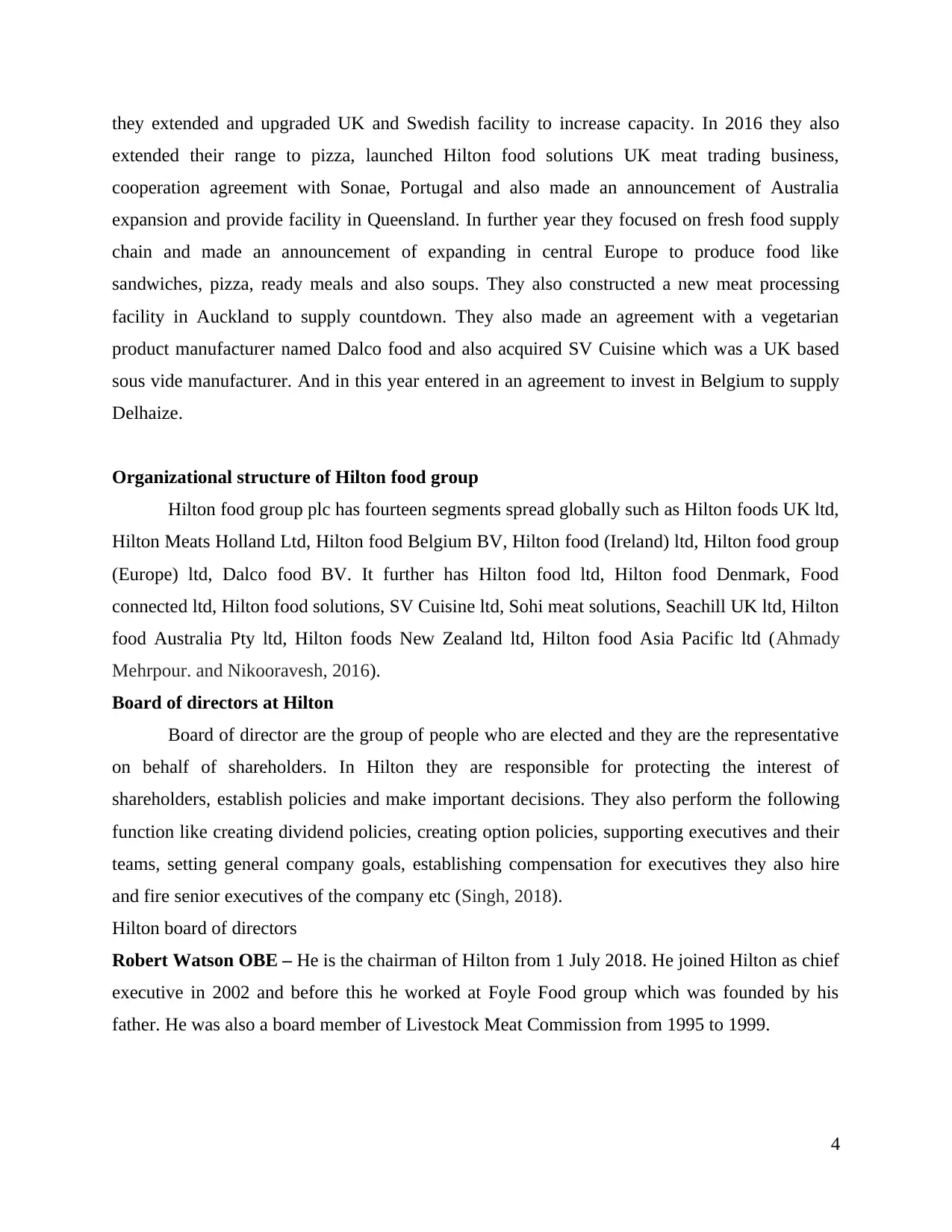
they extended and upgraded UK and Swedish facility to increase capacity. In 2016 they also
extended their range to pizza, launched Hilton food solutions UK meat trading business,
cooperation agreement with Sonae, Portugal and also made an announcement of Australia
expansion and provide facility in Queensland. In further year they focused on fresh food supply
chain and made an announcement of expanding in central Europe to produce food like
sandwiches, pizza, ready meals and also soups. They also constructed a new meat processing
facility in Auckland to supply countdown. They also made an agreement with a vegetarian
product manufacturer named Dalco food and also acquired SV Cuisine which was a UK based
sous vide manufacturer. And in this year entered in an agreement to invest in Belgium to supply
Delhaize.
Organizational structure of Hilton food group
Hilton food group plc has fourteen segments spread globally such as Hilton foods UK ltd,
Hilton Meats Holland Ltd, Hilton food Belgium BV, Hilton food (Ireland) ltd, Hilton food group
(Europe) ltd, Dalco food BV. It further has Hilton food ltd, Hilton food Denmark, Food
connected ltd, Hilton food solutions, SV Cuisine ltd, Sohi meat solutions, Seachill UK ltd, Hilton
food Australia Pty ltd, Hilton foods New Zealand ltd, Hilton food Asia Pacific ltd (Ahmady
Mehrpour. and Nikooravesh, 2016).
Board of directors at Hilton
Board of director are the group of people who are elected and they are the representative
on behalf of shareholders. In Hilton they are responsible for protecting the interest of
shareholders, establish policies and make important decisions. They also perform the following
function like creating dividend policies, creating option policies, supporting executives and their
teams, setting general company goals, establishing compensation for executives they also hire
and fire senior executives of the company etc (Singh, 2018).
Hilton board of directors
Robert Watson OBE – He is the chairman of Hilton from 1 July 2018. He joined Hilton as chief
executive in 2002 and before this he worked at Foyle Food group which was founded by his
father. He was also a board member of Livestock Meat Commission from 1995 to 1999.
4
extended their range to pizza, launched Hilton food solutions UK meat trading business,
cooperation agreement with Sonae, Portugal and also made an announcement of Australia
expansion and provide facility in Queensland. In further year they focused on fresh food supply
chain and made an announcement of expanding in central Europe to produce food like
sandwiches, pizza, ready meals and also soups. They also constructed a new meat processing
facility in Auckland to supply countdown. They also made an agreement with a vegetarian
product manufacturer named Dalco food and also acquired SV Cuisine which was a UK based
sous vide manufacturer. And in this year entered in an agreement to invest in Belgium to supply
Delhaize.
Organizational structure of Hilton food group
Hilton food group plc has fourteen segments spread globally such as Hilton foods UK ltd,
Hilton Meats Holland Ltd, Hilton food Belgium BV, Hilton food (Ireland) ltd, Hilton food group
(Europe) ltd, Dalco food BV. It further has Hilton food ltd, Hilton food Denmark, Food
connected ltd, Hilton food solutions, SV Cuisine ltd, Sohi meat solutions, Seachill UK ltd, Hilton
food Australia Pty ltd, Hilton foods New Zealand ltd, Hilton food Asia Pacific ltd (Ahmady
Mehrpour. and Nikooravesh, 2016).
Board of directors at Hilton
Board of director are the group of people who are elected and they are the representative
on behalf of shareholders. In Hilton they are responsible for protecting the interest of
shareholders, establish policies and make important decisions. They also perform the following
function like creating dividend policies, creating option policies, supporting executives and their
teams, setting general company goals, establishing compensation for executives they also hire
and fire senior executives of the company etc (Singh, 2018).
Hilton board of directors
Robert Watson OBE – He is the chairman of Hilton from 1 July 2018. He joined Hilton as chief
executive in 2002 and before this he worked at Foyle Food group which was founded by his
father. He was also a board member of Livestock Meat Commission from 1995 to 1999.
4
Paraphrase This Document
Need a fresh take? Get an instant paraphrase of this document with our AI Paraphraser
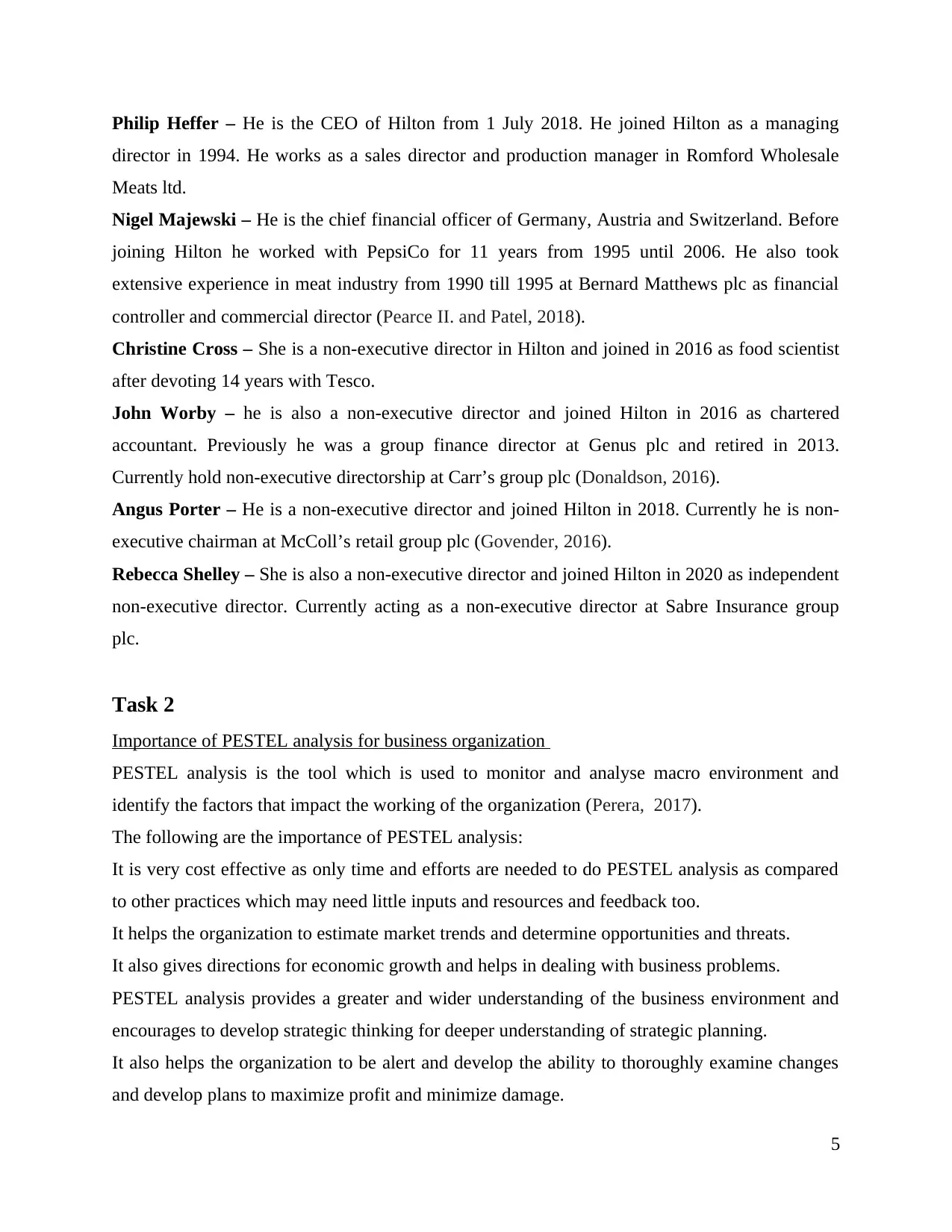
Philip Heffer – He is the CEO of Hilton from 1 July 2018. He joined Hilton as a managing
director in 1994. He works as a sales director and production manager in Romford Wholesale
Meats ltd.
Nigel Majewski – He is the chief financial officer of Germany, Austria and Switzerland. Before
joining Hilton he worked with PepsiCo for 11 years from 1995 until 2006. He also took
extensive experience in meat industry from 1990 till 1995 at Bernard Matthews plc as financial
controller and commercial director (Pearce II. and Patel, 2018).
Christine Cross – She is a non-executive director in Hilton and joined in 2016 as food scientist
after devoting 14 years with Tesco.
John Worby – he is also a non-executive director and joined Hilton in 2016 as chartered
accountant. Previously he was a group finance director at Genus plc and retired in 2013.
Currently hold non-executive directorship at Carr’s group plc (Donaldson, 2016).
Angus Porter – He is a non-executive director and joined Hilton in 2018. Currently he is non-
executive chairman at McColl’s retail group plc (Govender, 2016).
Rebecca Shelley – She is also a non-executive director and joined Hilton in 2020 as independent
non-executive director. Currently acting as a non-executive director at Sabre Insurance group
plc.
Task 2
Importance of PESTEL analysis for business organization
PESTEL analysis is the tool which is used to monitor and analyse macro environment and
identify the factors that impact the working of the organization (Perera, 2017).
The following are the importance of PESTEL analysis:
It is very cost effective as only time and efforts are needed to do PESTEL analysis as compared
to other practices which may need little inputs and resources and feedback too.
It helps the organization to estimate market trends and determine opportunities and threats.
It also gives directions for economic growth and helps in dealing with business problems.
PESTEL analysis provides a greater and wider understanding of the business environment and
encourages to develop strategic thinking for deeper understanding of strategic planning.
It also helps the organization to be alert and develop the ability to thoroughly examine changes
and develop plans to maximize profit and minimize damage.
5
director in 1994. He works as a sales director and production manager in Romford Wholesale
Meats ltd.
Nigel Majewski – He is the chief financial officer of Germany, Austria and Switzerland. Before
joining Hilton he worked with PepsiCo for 11 years from 1995 until 2006. He also took
extensive experience in meat industry from 1990 till 1995 at Bernard Matthews plc as financial
controller and commercial director (Pearce II. and Patel, 2018).
Christine Cross – She is a non-executive director in Hilton and joined in 2016 as food scientist
after devoting 14 years with Tesco.
John Worby – he is also a non-executive director and joined Hilton in 2016 as chartered
accountant. Previously he was a group finance director at Genus plc and retired in 2013.
Currently hold non-executive directorship at Carr’s group plc (Donaldson, 2016).
Angus Porter – He is a non-executive director and joined Hilton in 2018. Currently he is non-
executive chairman at McColl’s retail group plc (Govender, 2016).
Rebecca Shelley – She is also a non-executive director and joined Hilton in 2020 as independent
non-executive director. Currently acting as a non-executive director at Sabre Insurance group
plc.
Task 2
Importance of PESTEL analysis for business organization
PESTEL analysis is the tool which is used to monitor and analyse macro environment and
identify the factors that impact the working of the organization (Perera, 2017).
The following are the importance of PESTEL analysis:
It is very cost effective as only time and efforts are needed to do PESTEL analysis as compared
to other practices which may need little inputs and resources and feedback too.
It helps the organization to estimate market trends and determine opportunities and threats.
It also gives directions for economic growth and helps in dealing with business problems.
PESTEL analysis provides a greater and wider understanding of the business environment and
encourages to develop strategic thinking for deeper understanding of strategic planning.
It also helps the organization to be alert and develop the ability to thoroughly examine changes
and develop plans to maximize profit and minimize damage.
5
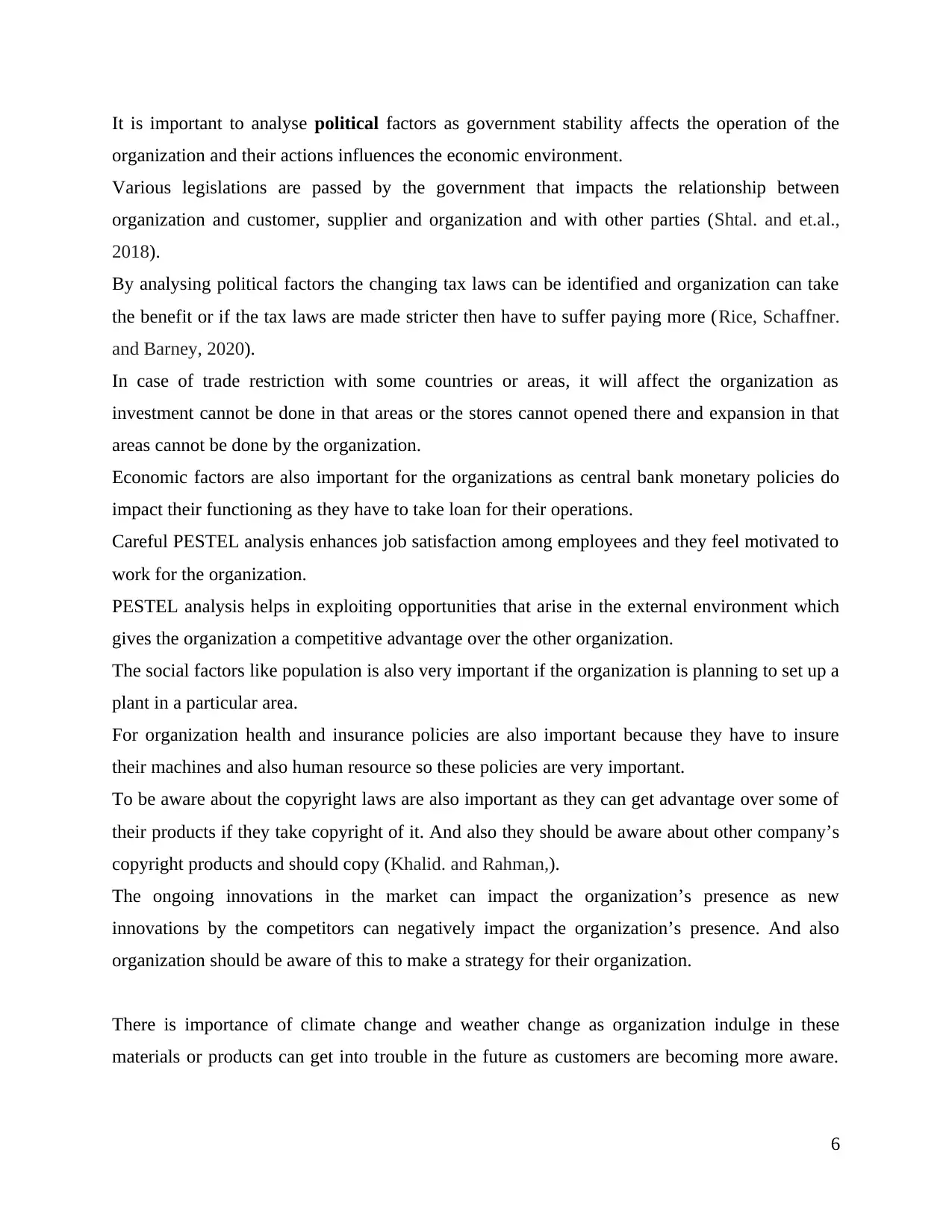
It is important to analyse political factors as government stability affects the operation of the
organization and their actions influences the economic environment.
Various legislations are passed by the government that impacts the relationship between
organization and customer, supplier and organization and with other parties (Shtal. and et.al.,
2018).
By analysing political factors the changing tax laws can be identified and organization can take
the benefit or if the tax laws are made stricter then have to suffer paying more (Rice, Schaffner.
and Barney, 2020).
In case of trade restriction with some countries or areas, it will affect the organization as
investment cannot be done in that areas or the stores cannot opened there and expansion in that
areas cannot be done by the organization.
Economic factors are also important for the organizations as central bank monetary policies do
impact their functioning as they have to take loan for their operations.
Careful PESTEL analysis enhances job satisfaction among employees and they feel motivated to
work for the organization.
PESTEL analysis helps in exploiting opportunities that arise in the external environment which
gives the organization a competitive advantage over the other organization.
The social factors like population is also very important if the organization is planning to set up a
plant in a particular area.
For organization health and insurance policies are also important because they have to insure
their machines and also human resource so these policies are very important.
To be aware about the copyright laws are also important as they can get advantage over some of
their products if they take copyright of it. And also they should be aware about other company’s
copyright products and should copy (Khalid. and Rahman,).
The ongoing innovations in the market can impact the organization’s presence as new
innovations by the competitors can negatively impact the organization’s presence. And also
organization should be aware of this to make a strategy for their organization.
There is importance of climate change and weather change as organization indulge in these
materials or products can get into trouble in the future as customers are becoming more aware.
6
organization and their actions influences the economic environment.
Various legislations are passed by the government that impacts the relationship between
organization and customer, supplier and organization and with other parties (Shtal. and et.al.,
2018).
By analysing political factors the changing tax laws can be identified and organization can take
the benefit or if the tax laws are made stricter then have to suffer paying more (Rice, Schaffner.
and Barney, 2020).
In case of trade restriction with some countries or areas, it will affect the organization as
investment cannot be done in that areas or the stores cannot opened there and expansion in that
areas cannot be done by the organization.
Economic factors are also important for the organizations as central bank monetary policies do
impact their functioning as they have to take loan for their operations.
Careful PESTEL analysis enhances job satisfaction among employees and they feel motivated to
work for the organization.
PESTEL analysis helps in exploiting opportunities that arise in the external environment which
gives the organization a competitive advantage over the other organization.
The social factors like population is also very important if the organization is planning to set up a
plant in a particular area.
For organization health and insurance policies are also important because they have to insure
their machines and also human resource so these policies are very important.
To be aware about the copyright laws are also important as they can get advantage over some of
their products if they take copyright of it. And also they should be aware about other company’s
copyright products and should copy (Khalid. and Rahman,).
The ongoing innovations in the market can impact the organization’s presence as new
innovations by the competitors can negatively impact the organization’s presence. And also
organization should be aware of this to make a strategy for their organization.
There is importance of climate change and weather change as organization indulge in these
materials or products can get into trouble in the future as customers are becoming more aware.
6
⊘ This is a preview!⊘
Do you want full access?
Subscribe today to unlock all pages.

Trusted by 1+ million students worldwide
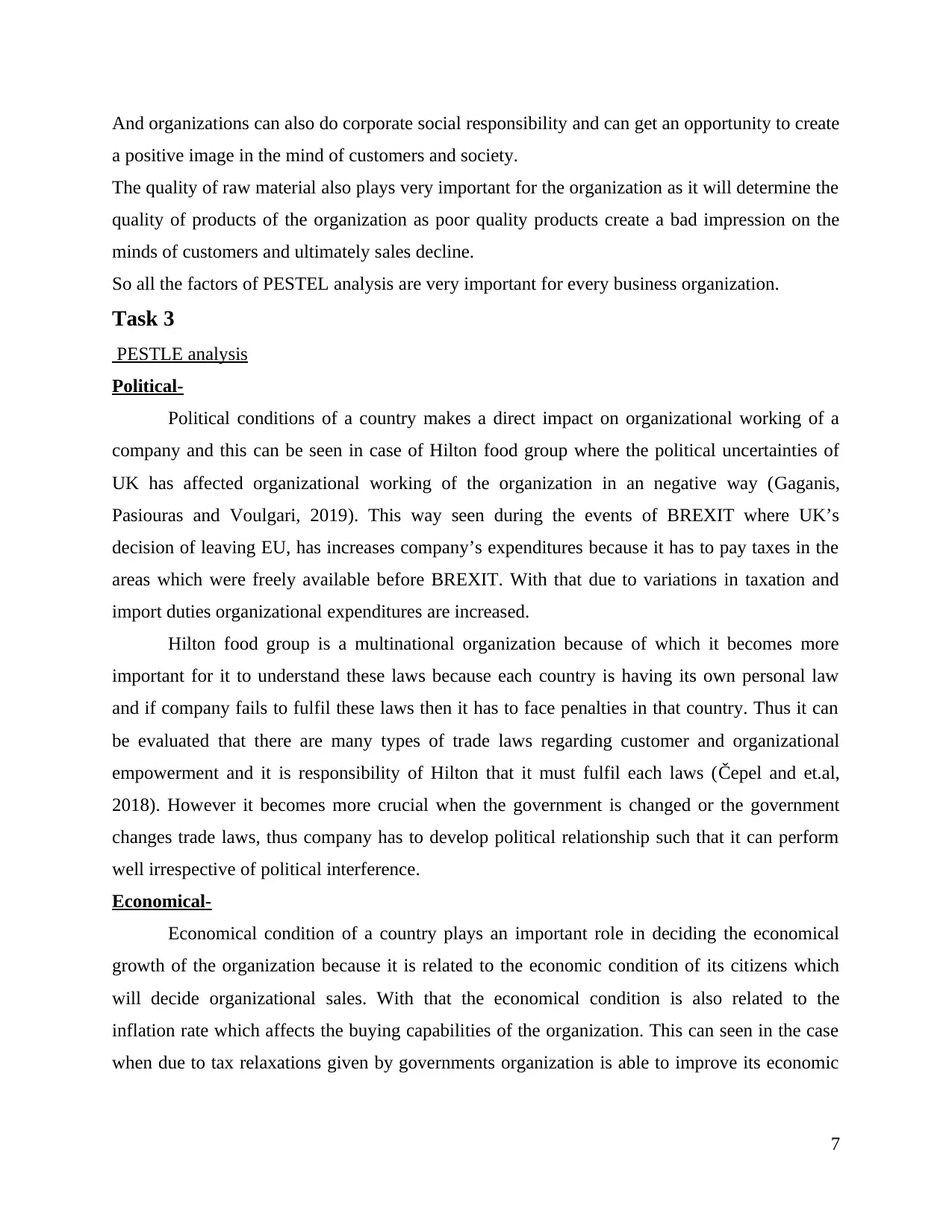
And organizations can also do corporate social responsibility and can get an opportunity to create
a positive image in the mind of customers and society.
The quality of raw material also plays very important for the organization as it will determine the
quality of products of the organization as poor quality products create a bad impression on the
minds of customers and ultimately sales decline.
So all the factors of PESTEL analysis are very important for every business organization.
Task 3
PESTLE analysis
Political-
Political conditions of a country makes a direct impact on organizational working of a
company and this can be seen in case of Hilton food group where the political uncertainties of
UK has affected organizational working of the organization in an negative way (Gaganis,
Pasiouras and Voulgari, 2019). This way seen during the events of BREXIT where UK’s
decision of leaving EU, has increases company’s expenditures because it has to pay taxes in the
areas which were freely available before BREXIT. With that due to variations in taxation and
import duties organizational expenditures are increased.
Hilton food group is a multinational organization because of which it becomes more
important for it to understand these laws because each country is having its own personal law
and if company fails to fulfil these laws then it has to face penalties in that country. Thus it can
be evaluated that there are many types of trade laws regarding customer and organizational
empowerment and it is responsibility of Hilton that it must fulfil each laws (Čepel and et.al,
2018). However it becomes more crucial when the government is changed or the government
changes trade laws, thus company has to develop political relationship such that it can perform
well irrespective of political interference.
Economical-
Economical condition of a country plays an important role in deciding the economical
growth of the organization because it is related to the economic condition of its citizens which
will decide organizational sales. With that the economical condition is also related to the
inflation rate which affects the buying capabilities of the organization. This can seen in the case
when due to tax relaxations given by governments organization is able to improve its economic
7
a positive image in the mind of customers and society.
The quality of raw material also plays very important for the organization as it will determine the
quality of products of the organization as poor quality products create a bad impression on the
minds of customers and ultimately sales decline.
So all the factors of PESTEL analysis are very important for every business organization.
Task 3
PESTLE analysis
Political-
Political conditions of a country makes a direct impact on organizational working of a
company and this can be seen in case of Hilton food group where the political uncertainties of
UK has affected organizational working of the organization in an negative way (Gaganis,
Pasiouras and Voulgari, 2019). This way seen during the events of BREXIT where UK’s
decision of leaving EU, has increases company’s expenditures because it has to pay taxes in the
areas which were freely available before BREXIT. With that due to variations in taxation and
import duties organizational expenditures are increased.
Hilton food group is a multinational organization because of which it becomes more
important for it to understand these laws because each country is having its own personal law
and if company fails to fulfil these laws then it has to face penalties in that country. Thus it can
be evaluated that there are many types of trade laws regarding customer and organizational
empowerment and it is responsibility of Hilton that it must fulfil each laws (Čepel and et.al,
2018). However it becomes more crucial when the government is changed or the government
changes trade laws, thus company has to develop political relationship such that it can perform
well irrespective of political interference.
Economical-
Economical condition of a country plays an important role in deciding the economical
growth of the organization because it is related to the economic condition of its citizens which
will decide organizational sales. With that the economical condition is also related to the
inflation rate which affects the buying capabilities of the organization. This can seen in the case
when due to tax relaxations given by governments organization is able to improve its economic
7
Paraphrase This Document
Need a fresh take? Get an instant paraphrase of this document with our AI Paraphraser
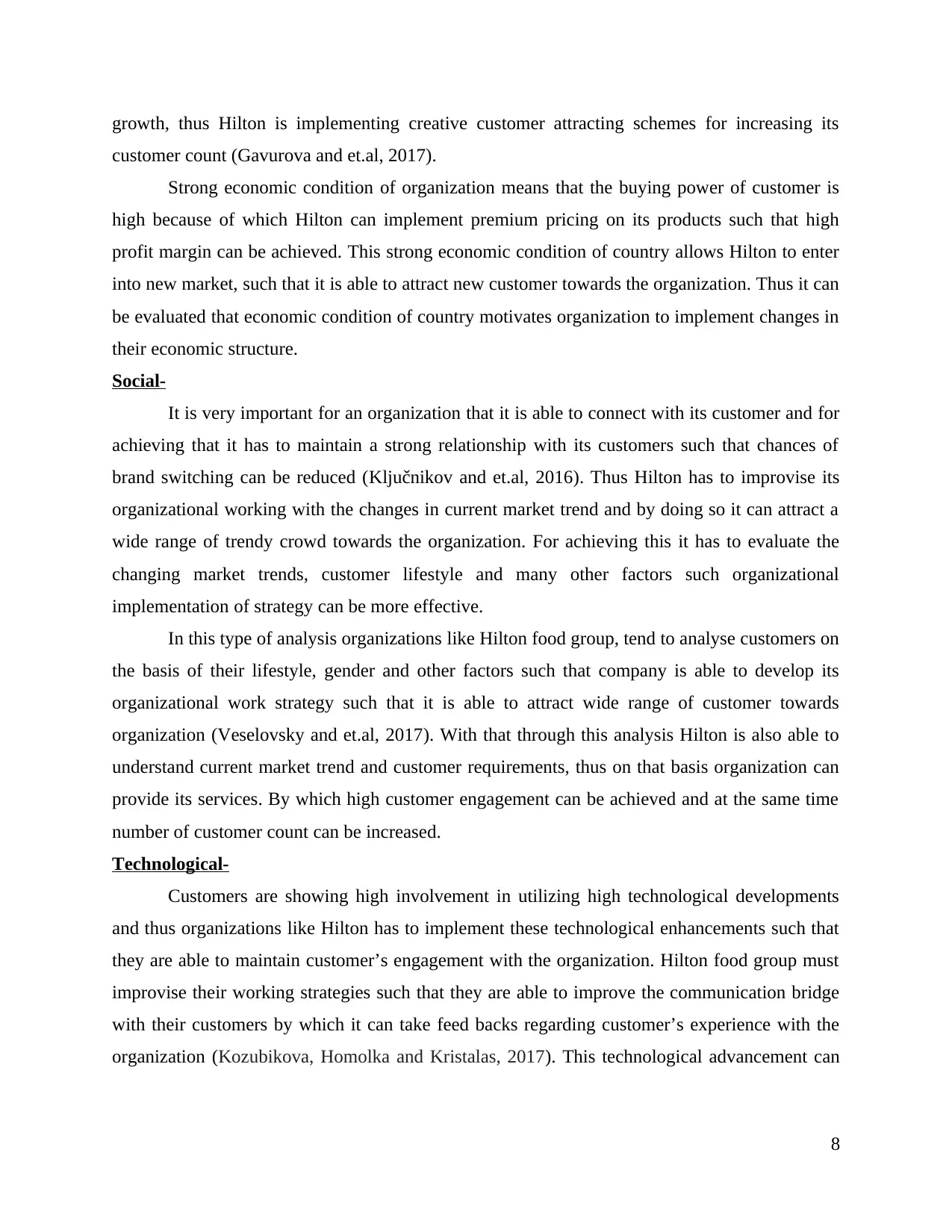
growth, thus Hilton is implementing creative customer attracting schemes for increasing its
customer count (Gavurova and et.al, 2017).
Strong economic condition of organization means that the buying power of customer is
high because of which Hilton can implement premium pricing on its products such that high
profit margin can be achieved. This strong economic condition of country allows Hilton to enter
into new market, such that it is able to attract new customer towards the organization. Thus it can
be evaluated that economic condition of country motivates organization to implement changes in
their economic structure.
Social-
It is very important for an organization that it is able to connect with its customer and for
achieving that it has to maintain a strong relationship with its customers such that chances of
brand switching can be reduced (Ključnikov and et.al, 2016). Thus Hilton has to improvise its
organizational working with the changes in current market trend and by doing so it can attract a
wide range of trendy crowd towards the organization. For achieving this it has to evaluate the
changing market trends, customer lifestyle and many other factors such organizational
implementation of strategy can be more effective.
In this type of analysis organizations like Hilton food group, tend to analyse customers on
the basis of their lifestyle, gender and other factors such that company is able to develop its
organizational work strategy such that it is able to attract wide range of customer towards
organization (Veselovsky and et.al, 2017). With that through this analysis Hilton is also able to
understand current market trend and customer requirements, thus on that basis organization can
provide its services. By which high customer engagement can be achieved and at the same time
number of customer count can be increased.
Technological-
Customers are showing high involvement in utilizing high technological developments
and thus organizations like Hilton has to implement these technological enhancements such that
they are able to maintain customer’s engagement with the organization. Hilton food group must
improvise their working strategies such that they are able to improve the communication bridge
with their customers by which it can take feed backs regarding customer’s experience with the
organization (Kozubikova, Homolka and Kristalas, 2017). This technological advancement can
8
customer count (Gavurova and et.al, 2017).
Strong economic condition of organization means that the buying power of customer is
high because of which Hilton can implement premium pricing on its products such that high
profit margin can be achieved. This strong economic condition of country allows Hilton to enter
into new market, such that it is able to attract new customer towards the organization. Thus it can
be evaluated that economic condition of country motivates organization to implement changes in
their economic structure.
Social-
It is very important for an organization that it is able to connect with its customer and for
achieving that it has to maintain a strong relationship with its customers such that chances of
brand switching can be reduced (Ključnikov and et.al, 2016). Thus Hilton has to improvise its
organizational working with the changes in current market trend and by doing so it can attract a
wide range of trendy crowd towards the organization. For achieving this it has to evaluate the
changing market trends, customer lifestyle and many other factors such organizational
implementation of strategy can be more effective.
In this type of analysis organizations like Hilton food group, tend to analyse customers on
the basis of their lifestyle, gender and other factors such that company is able to develop its
organizational work strategy such that it is able to attract wide range of customer towards
organization (Veselovsky and et.al, 2017). With that through this analysis Hilton is also able to
understand current market trend and customer requirements, thus on that basis organization can
provide its services. By which high customer engagement can be achieved and at the same time
number of customer count can be increased.
Technological-
Customers are showing high involvement in utilizing high technological developments
and thus organizations like Hilton has to implement these technological enhancements such that
they are able to maintain customer’s engagement with the organization. Hilton food group must
improvise their working strategies such that they are able to improve the communication bridge
with their customers by which it can take feed backs regarding customer’s experience with the
organization (Kozubikova, Homolka and Kristalas, 2017). This technological advancement can
8
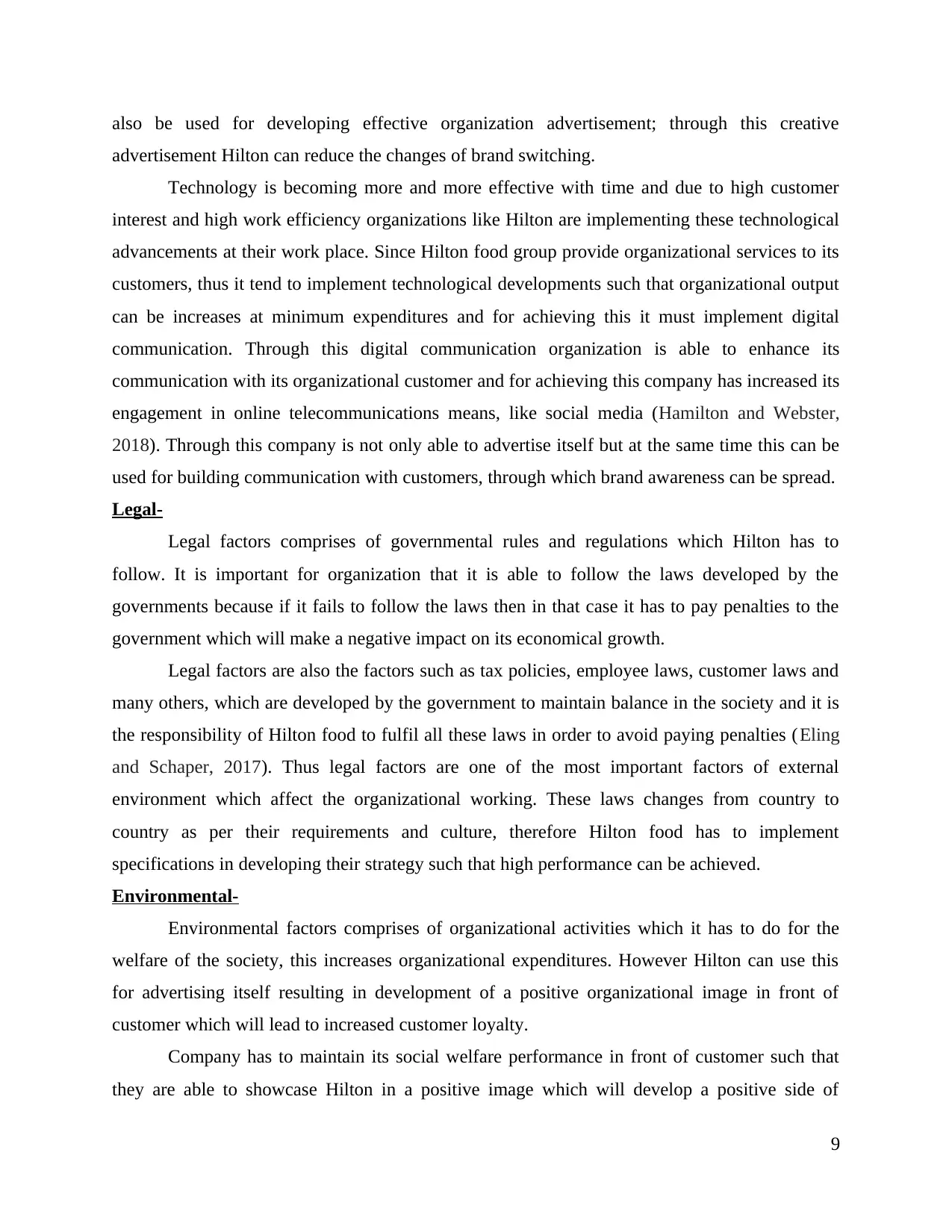
also be used for developing effective organization advertisement; through this creative
advertisement Hilton can reduce the changes of brand switching.
Technology is becoming more and more effective with time and due to high customer
interest and high work efficiency organizations like Hilton are implementing these technological
advancements at their work place. Since Hilton food group provide organizational services to its
customers, thus it tend to implement technological developments such that organizational output
can be increases at minimum expenditures and for achieving this it must implement digital
communication. Through this digital communication organization is able to enhance its
communication with its organizational customer and for achieving this company has increased its
engagement in online telecommunications means, like social media (Hamilton and Webster,
2018). Through this company is not only able to advertise itself but at the same time this can be
used for building communication with customers, through which brand awareness can be spread.
Legal-
Legal factors comprises of governmental rules and regulations which Hilton has to
follow. It is important for organization that it is able to follow the laws developed by the
governments because if it fails to follow the laws then in that case it has to pay penalties to the
government which will make a negative impact on its economical growth.
Legal factors are also the factors such as tax policies, employee laws, customer laws and
many others, which are developed by the government to maintain balance in the society and it is
the responsibility of Hilton food to fulfil all these laws in order to avoid paying penalties (Eling
and Schaper, 2017). Thus legal factors are one of the most important factors of external
environment which affect the organizational working. These laws changes from country to
country as per their requirements and culture, therefore Hilton food has to implement
specifications in developing their strategy such that high performance can be achieved.
Environmental-
Environmental factors comprises of organizational activities which it has to do for the
welfare of the society, this increases organizational expenditures. However Hilton can use this
for advertising itself resulting in development of a positive organizational image in front of
customer which will lead to increased customer loyalty.
Company has to maintain its social welfare performance in front of customer such that
they are able to showcase Hilton in a positive image which will develop a positive side of
9
advertisement Hilton can reduce the changes of brand switching.
Technology is becoming more and more effective with time and due to high customer
interest and high work efficiency organizations like Hilton are implementing these technological
advancements at their work place. Since Hilton food group provide organizational services to its
customers, thus it tend to implement technological developments such that organizational output
can be increases at minimum expenditures and for achieving this it must implement digital
communication. Through this digital communication organization is able to enhance its
communication with its organizational customer and for achieving this company has increased its
engagement in online telecommunications means, like social media (Hamilton and Webster,
2018). Through this company is not only able to advertise itself but at the same time this can be
used for building communication with customers, through which brand awareness can be spread.
Legal-
Legal factors comprises of governmental rules and regulations which Hilton has to
follow. It is important for organization that it is able to follow the laws developed by the
governments because if it fails to follow the laws then in that case it has to pay penalties to the
government which will make a negative impact on its economical growth.
Legal factors are also the factors such as tax policies, employee laws, customer laws and
many others, which are developed by the government to maintain balance in the society and it is
the responsibility of Hilton food to fulfil all these laws in order to avoid paying penalties (Eling
and Schaper, 2017). Thus legal factors are one of the most important factors of external
environment which affect the organizational working. These laws changes from country to
country as per their requirements and culture, therefore Hilton food has to implement
specifications in developing their strategy such that high performance can be achieved.
Environmental-
Environmental factors comprises of organizational activities which it has to do for the
welfare of the society, this increases organizational expenditures. However Hilton can use this
for advertising itself resulting in development of a positive organizational image in front of
customer which will lead to increased customer loyalty.
Company has to maintain its social welfare performance in front of customer such that
they are able to showcase Hilton in a positive image which will develop a positive side of
9
⊘ This is a preview!⊘
Do you want full access?
Subscribe today to unlock all pages.

Trusted by 1+ million students worldwide
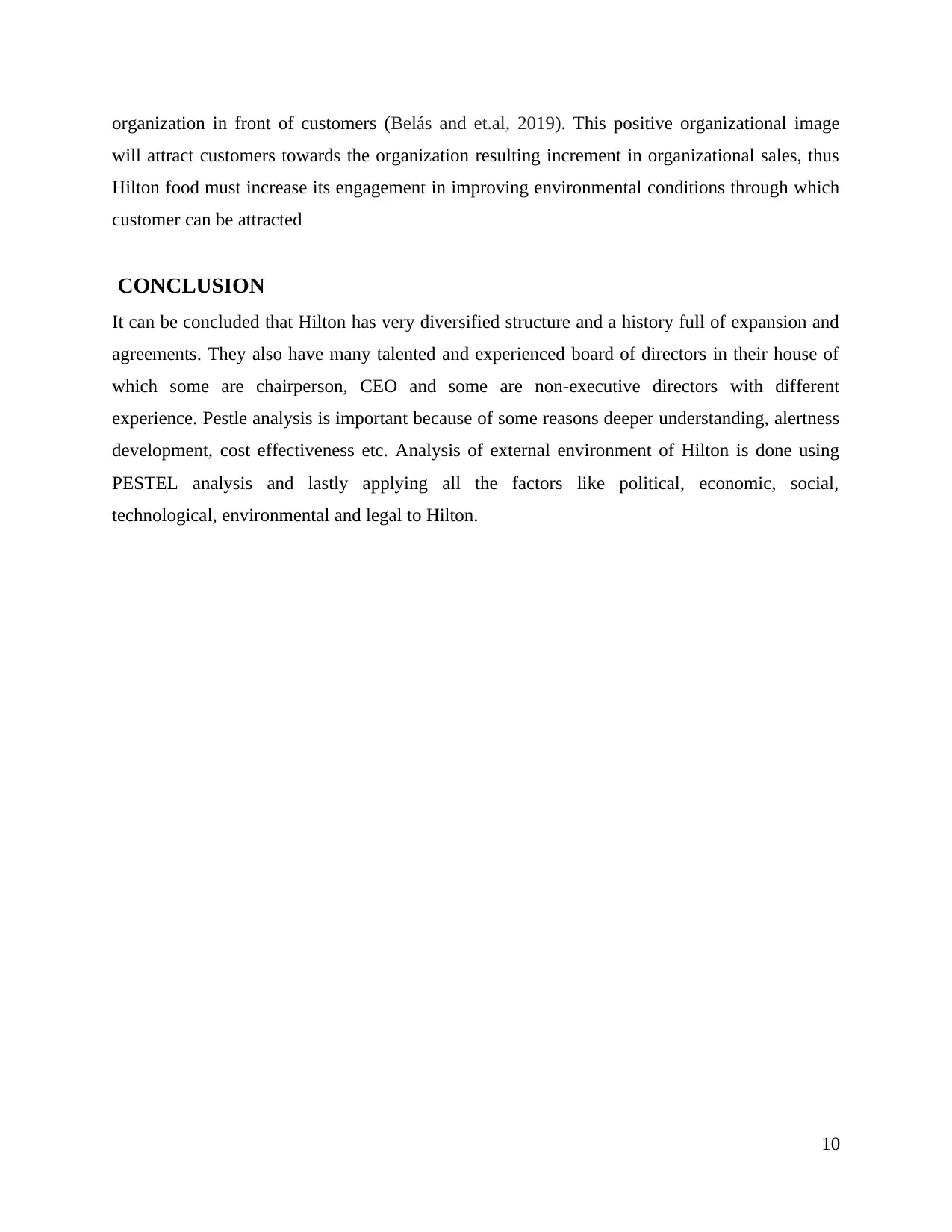
organization in front of customers (Belás and et.al, 2019). This positive organizational image
will attract customers towards the organization resulting increment in organizational sales, thus
Hilton food must increase its engagement in improving environmental conditions through which
customer can be attracted
CONCLUSION
It can be concluded that Hilton has very diversified structure and a history full of expansion and
agreements. They also have many talented and experienced board of directors in their house of
which some are chairperson, CEO and some are non-executive directors with different
experience. Pestle analysis is important because of some reasons deeper understanding, alertness
development, cost effectiveness etc. Analysis of external environment of Hilton is done using
PESTEL analysis and lastly applying all the factors like political, economic, social,
technological, environmental and legal to Hilton.
10
will attract customers towards the organization resulting increment in organizational sales, thus
Hilton food must increase its engagement in improving environmental conditions through which
customer can be attracted
CONCLUSION
It can be concluded that Hilton has very diversified structure and a history full of expansion and
agreements. They also have many talented and experienced board of directors in their house of
which some are chairperson, CEO and some are non-executive directors with different
experience. Pestle analysis is important because of some reasons deeper understanding, alertness
development, cost effectiveness etc. Analysis of external environment of Hilton is done using
PESTEL analysis and lastly applying all the factors like political, economic, social,
technological, environmental and legal to Hilton.
10
Paraphrase This Document
Need a fresh take? Get an instant paraphrase of this document with our AI Paraphraser
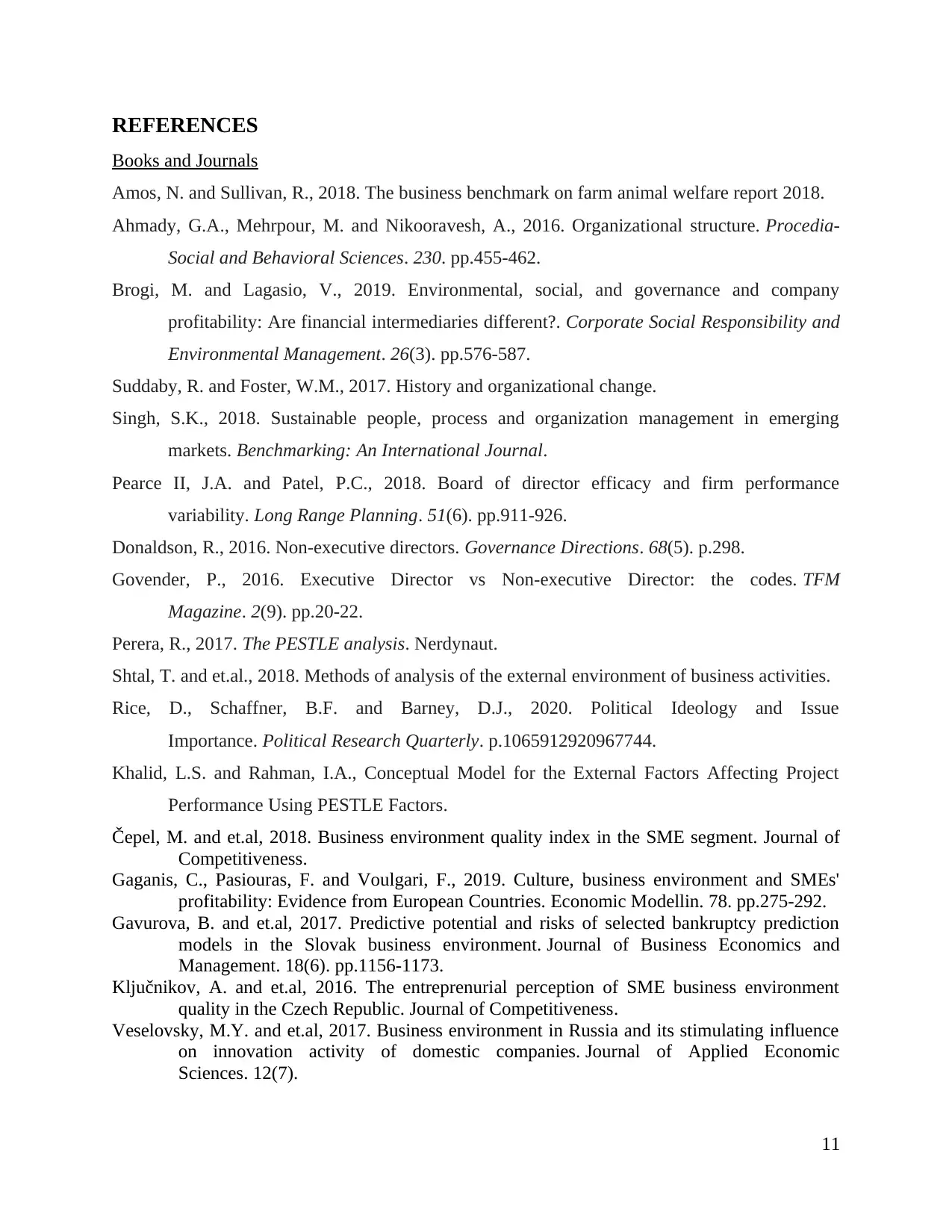
REFERENCES
Books and Journals
Amos, N. and Sullivan, R., 2018. The business benchmark on farm animal welfare report 2018.
Ahmady, G.A., Mehrpour, M. and Nikooravesh, A., 2016. Organizational structure. Procedia-
Social and Behavioral Sciences. 230. pp.455-462.
Brogi, M. and Lagasio, V., 2019. Environmental, social, and governance and company
profitability: Are financial intermediaries different?. Corporate Social Responsibility and
Environmental Management. 26(3). pp.576-587.
Suddaby, R. and Foster, W.M., 2017. History and organizational change.
Singh, S.K., 2018. Sustainable people, process and organization management in emerging
markets. Benchmarking: An International Journal.
Pearce II, J.A. and Patel, P.C., 2018. Board of director efficacy and firm performance
variability. Long Range Planning. 51(6). pp.911-926.
Donaldson, R., 2016. Non-executive directors. Governance Directions. 68(5). p.298.
Govender, P., 2016. Executive Director vs Non-executive Director: the codes. TFM
Magazine. 2(9). pp.20-22.
Perera, R., 2017. The PESTLE analysis. Nerdynaut.
Shtal, T. and et.al., 2018. Methods of analysis of the external environment of business activities.
Rice, D., Schaffner, B.F. and Barney, D.J., 2020. Political Ideology and Issue
Importance. Political Research Quarterly. p.1065912920967744.
Khalid, L.S. and Rahman, I.A., Conceptual Model for the External Factors Affecting Project
Performance Using PESTLE Factors.
Čepel, M. and et.al, 2018. Business environment quality index in the SME segment. Journal of
Competitiveness.
Gaganis, C., Pasiouras, F. and Voulgari, F., 2019. Culture, business environment and SMEs'
profitability: Evidence from European Countries. Economic Modellin. 78. pp.275-292.
Gavurova, B. and et.al, 2017. Predictive potential and risks of selected bankruptcy prediction
models in the Slovak business environment. Journal of Business Economics and
Management. 18(6). pp.1156-1173.
Ključnikov, A. and et.al, 2016. The entreprenurial perception of SME business environment
quality in the Czech Republic. Journal of Competitiveness.
Veselovsky, M.Y. and et.al, 2017. Business environment in Russia and its stimulating influence
on innovation activity of domestic companies. Journal of Applied Economic
Sciences. 12(7).
11
Books and Journals
Amos, N. and Sullivan, R., 2018. The business benchmark on farm animal welfare report 2018.
Ahmady, G.A., Mehrpour, M. and Nikooravesh, A., 2016. Organizational structure. Procedia-
Social and Behavioral Sciences. 230. pp.455-462.
Brogi, M. and Lagasio, V., 2019. Environmental, social, and governance and company
profitability: Are financial intermediaries different?. Corporate Social Responsibility and
Environmental Management. 26(3). pp.576-587.
Suddaby, R. and Foster, W.M., 2017. History and organizational change.
Singh, S.K., 2018. Sustainable people, process and organization management in emerging
markets. Benchmarking: An International Journal.
Pearce II, J.A. and Patel, P.C., 2018. Board of director efficacy and firm performance
variability. Long Range Planning. 51(6). pp.911-926.
Donaldson, R., 2016. Non-executive directors. Governance Directions. 68(5). p.298.
Govender, P., 2016. Executive Director vs Non-executive Director: the codes. TFM
Magazine. 2(9). pp.20-22.
Perera, R., 2017. The PESTLE analysis. Nerdynaut.
Shtal, T. and et.al., 2018. Methods of analysis of the external environment of business activities.
Rice, D., Schaffner, B.F. and Barney, D.J., 2020. Political Ideology and Issue
Importance. Political Research Quarterly. p.1065912920967744.
Khalid, L.S. and Rahman, I.A., Conceptual Model for the External Factors Affecting Project
Performance Using PESTLE Factors.
Čepel, M. and et.al, 2018. Business environment quality index in the SME segment. Journal of
Competitiveness.
Gaganis, C., Pasiouras, F. and Voulgari, F., 2019. Culture, business environment and SMEs'
profitability: Evidence from European Countries. Economic Modellin. 78. pp.275-292.
Gavurova, B. and et.al, 2017. Predictive potential and risks of selected bankruptcy prediction
models in the Slovak business environment. Journal of Business Economics and
Management. 18(6). pp.1156-1173.
Ključnikov, A. and et.al, 2016. The entreprenurial perception of SME business environment
quality in the Czech Republic. Journal of Competitiveness.
Veselovsky, M.Y. and et.al, 2017. Business environment in Russia and its stimulating influence
on innovation activity of domestic companies. Journal of Applied Economic
Sciences. 12(7).
11
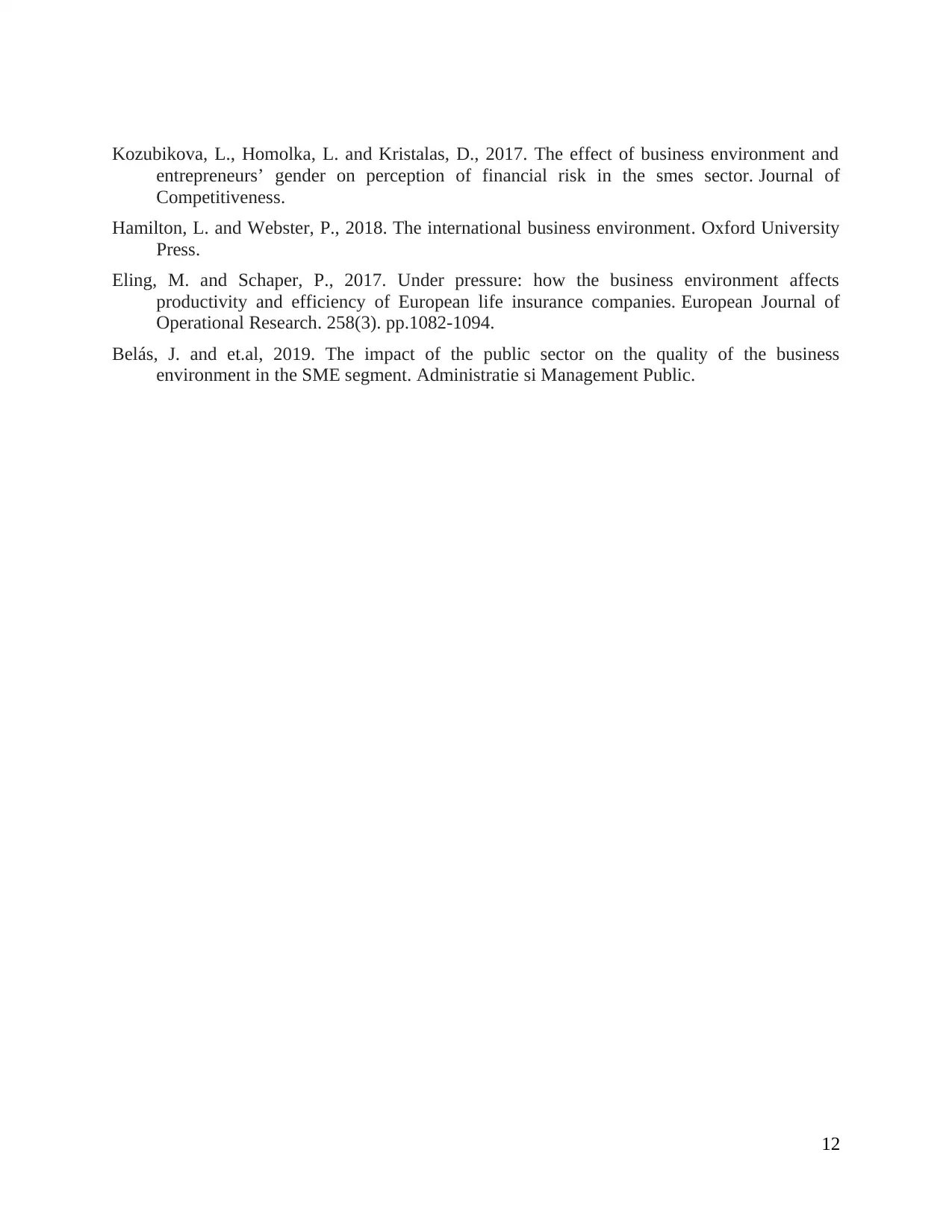
Kozubikova, L., Homolka, L. and Kristalas, D., 2017. The effect of business environment and
entrepreneurs’ gender on perception of financial risk in the smes sector. Journal of
Competitiveness.
Hamilton, L. and Webster, P., 2018. The international business environment. Oxford University
Press.
Eling, M. and Schaper, P., 2017. Under pressure: how the business environment affects
productivity and efficiency of European life insurance companies. European Journal of
Operational Research. 258(3). pp.1082-1094.
Belás, J. and et.al, 2019. The impact of the public sector on the quality of the business
environment in the SME segment. Administratie si Management Public.
12
entrepreneurs’ gender on perception of financial risk in the smes sector. Journal of
Competitiveness.
Hamilton, L. and Webster, P., 2018. The international business environment. Oxford University
Press.
Eling, M. and Schaper, P., 2017. Under pressure: how the business environment affects
productivity and efficiency of European life insurance companies. European Journal of
Operational Research. 258(3). pp.1082-1094.
Belás, J. and et.al, 2019. The impact of the public sector on the quality of the business
environment in the SME segment. Administratie si Management Public.
12
⊘ This is a preview!⊘
Do you want full access?
Subscribe today to unlock all pages.

Trusted by 1+ million students worldwide
1 out of 13
Related Documents
Your All-in-One AI-Powered Toolkit for Academic Success.
+13062052269
info@desklib.com
Available 24*7 on WhatsApp / Email
![[object Object]](/_next/static/media/star-bottom.7253800d.svg)
Unlock your academic potential
Copyright © 2020–2026 A2Z Services. All Rights Reserved. Developed and managed by ZUCOL.





